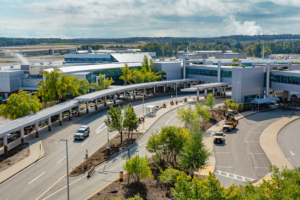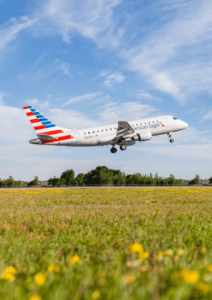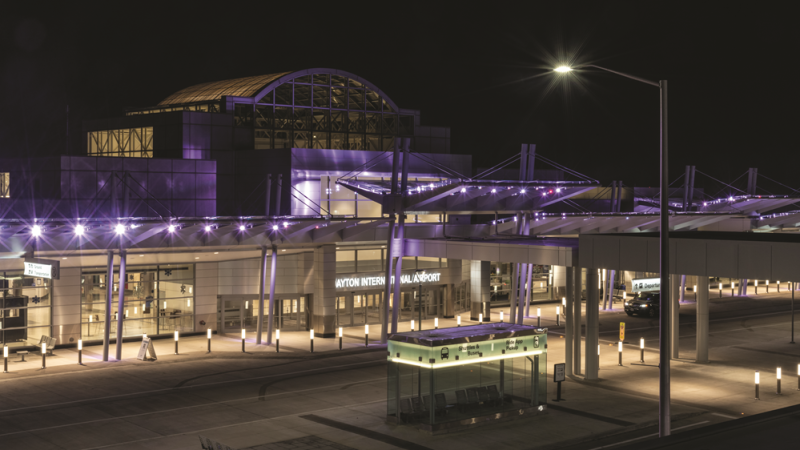Strategically located near the heart of New England, Manchester-Boston Regional Airport has access to all the wonderful things the region has to offer. “We are close to the beautiful mountains in the northern part of New Hampshire, with more mountains to the west, the New Hampshire seacoast to the east, and Boston to the southeast,” says Ted Kitchens, Director of Aviation for the airport. “There are over a thousand lakes in the state of New Hampshire and incalculable trailheads. We have 48 mountains with peaks over 4,000 feet. It is some of the most beautiful terrain I have seen in any state, and we are the gateway to that for anyone coming into New England.”
At the same time, the airport’s location offers access to the Boston market- but without the Boston prices.
Kitchens believes in making that gateway as welcoming as possible. It is a point of pride at Manchester-Boston Regional Airport that the passengers who pass through it are called “guests,” not “customers.” It is a small detail, but one that is emblematic of the airport’s entire philosophy.
“It is about understanding where and who your guest is and what their expectations are, then aligning the entire organisation’s efforts to meet and exceed those expectations,” Kitchens insists. “You need to solve problems before your guests are aware of them. If you think about world-class hotels, you do not go to ‘customer service.’ You go to ‘guest relations.’ They are proactive, not reactive, about managing the property and their guests’ experience.”
 The airport’s philosophy takes into account the entire journey its guest goes through when it enters the facility.
The airport’s philosophy takes into account the entire journey its guest goes through when it enters the facility.
“The ability of the airport to control that experience varies,” Kitchens acknowledges. “If you are at the ticket counter, that is the airline’s realm, and they dictate what kind of experience they can provide. But we like to influence those areas and touch points even where we do not have 100% control. It all comes down to relationships with guests and service providers, getting them all philosophically aligned.”
In the end, it comes down to the little things.
“We frequently will waive a guest’s parking,” Kitchens points out. “If it makes the guest happy after a bad experience, then fine. I would rather have repeat revenue than that short-term gain.”
Balancing the Books
But while Kitchens is happy to be generous when the opportunity presents itself, ultimately the airport still has to balance its books at the end of the financial year, and this has been a challenge in the past.
Not long ago, Manchester-Boston Airport had the highest operating costs of any airport in the New Hampshire region.
“Historically our airport costs had been increasing as passenger and enplanement levels decreased,” Kitchens recalls. “From a peak in 2005 to about 2019 the airport saw a slow decrease in enplanement levels, due to the global financial meltdown in 2008. At the same time, massive amounts of mergers and acquisitions activity meant that airlines were not flying as many seats.”
As a result of all these shocks to the aviation system, the airport’s previous management set out to control operating costs by not filling vacancies and managing contract costs.
“It stemmed the tide, but it was a losing battle,” Kitchens recalls.
When Kitchens came on board in 2018, he immediately saw that the biggest challenge was the airport’s debt load.
 “Our balance sheet was heavily leveraged. 40% of our income was debt maintenance,” he says.
“Our balance sheet was heavily leveraged. 40% of our income was debt maintenance,” he says.
In the USA, capital development at airports is financed through a ‘Passenger Facility Charge’ (PFC) which is typically pledged to service publicly issued bond debt. The PFC is a $4.50 fee added to the ticket and paid to the airport the passenger departs from. If they get on at Manchester-Boston Regional Airport, Manchester-Boston Regional gets it. If the passenger gets on at Boston-Logan International Airport, they get it, regardless of where the passenger booked the flight.
Manchester-Boston Regional Airport’s collection rates were decreasing alongside enplanement levels, and in 2013 that revenue was not enough to pay for the airport’s debt, creating an unserviced debt requirement of about $3.00 per passenger.
“Our airline cost at the time was around $13.50; that meant that about 25% of the airline’s cost-per-enplanement was due to our debt,” Kitchens explains. “So shortly after I came on board, we started restructuring our debt. We closed on a first round of restructuring on March 31st, 2020, and we were lucky we did it when we did.”
Not long after that deal closed, air travel around the world shut down to try and stem the flow of the Covid-19 virus.
“If we had not completed the restructuring, then I believe no bank would have touched us,” Kitchens says. “So instead of $13 cost-per-enplanement, we would have been looking at $50. We managed to have it only go up to $30, at a time when cash was important for airlines.”
The airport subsequently completed a second round of restructuring in 2023 that was purchased by a British investment company.
“We had to educate them on how airports are financed in the States,” Kitchens says. “It is completely different from the rest of the world.”
The end result is that Manchester-Boston Regional Airport has gone from the airport with the highest operating costs in the region, to an airport with one of the lowest.
This is particularly impressive at a time when operating costs are rising across the board.
“Our cost-per-enplanement has only increased by US$1 compared to pre-pandemic, but without the debt restructuring work, our cost-per-enplanement would be around $20 this year. This allows our airline partners to keep more of their money,” Kitchens says. “If we hit our airline target, then our cost-per-enplanement could be lower than it was in 2019.”
 The Path Forwards
The Path Forwards
Given all the airport has achieved, Kitchens is understandably optimistic about the future, but he is aware of coming challenges too.
“I’m cautiously optimistic but not naïve enough not to notice storm clouds on the horizon,” he says, referring to the global economic and geopolitical situation. “But we are on a good trajectory as an airport. We went 17 years without announcing a new airline, but with the addition of Spirit Airlines in 2021 and Avelo Airlines in 2023, as well as cargo airline Atlas Airways in 2022, things are looking up.”
Meanwhile, the New Hampshire economy is booming, with a 2% unemployment rate, strong population growth, and the state GDP growing faster than the US as a whole and nearby Massachusetts.
“Coupled with the natural beauty we have, you can see why people are flooding here from Boston, New York, and even as far west as California,” Kitchens says. “We are seeing a lot of private VC and government investment.”
One growth industry Kitchens points to is biofabrication which can offer potential treatment for chronic issues like diabetes, kidney failure, and heart disease, including one company making replacement hearts from stem cells.
“At the turn of the 20th century, downtown Manchester had the largest mill yards, and they made denim for the original 501 Levi Jeans,” Kitchens says. “Now we are fabricating therapeutics that hold the promise of solving diseases that represent a US$1 trillion drag on the US economy. I like to say we have gone from Jeans to Genes!”
When we speak to Kitchens, Manchester-Boston Regional Airport has been awarded sixth place in the USA TODAY 10Best Readers’ Choice Awards, following up on their Travel + Leisure World’s Best Awards recognition as the best domestic airport in the United States. If the airport’s trajectory continues, even more accolades cannot be far behind.







